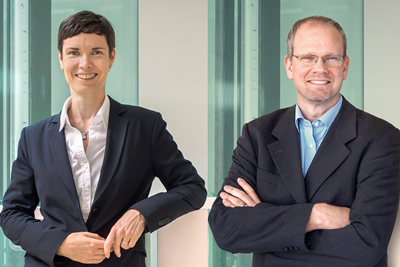
News
News and updates about the Nacaps project and research results

„A huge task“
Interview with Kolja Briedis and Antje Wegner about the first Nacaps survey, the data processing and the public release of the first results
In spring more than 25.000 doctoral candidates from all over Germany have participated in the Nacaps survey of the DZHW. What do you do with the data now?
Kolja Briedis: The information provided by the doctoral candidates must now be processed, cleaned, weighted and evaluated. It takes some time to do that accurately. For example: the free text information has to be coded - which is a huge task for our 25.000 completed questionnaires. Furthermore, in every survey you also receive incomplete questionnaires. We have to take a careful look at those, check the plausibility of the information to filter out the ones that did not take the survey seriously. Moreover, initially we planned to compare our population with the official statistics but now - against expectation - there are no usable data available. That is why we are looking for alternatives and consult with experts.
When will the first results be published?
Antje Wegner: We are currently developing a publicly accessible data portal that will give an overview about the survey results. It will probably go online by the end of this year. We have prepared a number of indicators and ratios, e.g. regarding the mentoring situation, the working conditions, the motives for doing a doctorate and career intentions of our respondents. Of course we also analyse the data more deeply for a scientific use and present these results on conferences and in scientific journals. This is something we already do since the start of the project - e.g. Uwe Ruß and Almuth Lietz of the Nacaps team have recently presented some insights about the meaning of incentives in surveys at a conference of the European Survey Research Association.
Kolja Briedis: Furthermore, in 2021 the next “National report on Junior Scholars” (BuWiN) will be released. Our results will be an important input for this politically highly relevant stocktaking. In the meantime we also like to visit HEIs at symposia or panel discussions about early career researchers. For us it is important that our data serves as a solid empirically contribution to oftentimes heated debates.
Can external researchers actually use the data for their own research?
Antje Wegner: Yes – we expect that external researchers will be able to use the data by the middle of next year. By then the data will be provided by the Research Data Center (FDZ) of the DZHW as scientific use files - anonymised data sets that can be used for scientific purposes only.
What is planned in the long run? What are the next steps?
Antje Wegner: We want to know what happens to the doctoral candidates of today – where will they be in 5, 10 or 15 years? Who stays in academia, who may enter the business world, and why? What is a doctorate good for – individually and from a societal perspective? We would also like to accompany those who quit their doctorate project. To make such assertions about the career paths of young researchers it is necessary to ask them again and again. The participants of this year´s survey will therefore be invited to participate again next year, if they have given us their consent to do so, and then again - every year. From experience the group of participants shrinks from year to year and we will make a great effort to keep this so called panel mortality low – e.g. with a steady contact, but also without bothering too much!
Kolja Briedis: Starting from 2021 we will also invite new cohorts of doctoral candidates to participate. By this, we can monitor the future generations, too. This is a lot of work but it is the only way to get solid information about career paths of doctoral candidates and that is our goal!
Kolja Briedis and Antje Wegner as well as Bernd Martens are the PIs of the National Academics Panel Study (Nacaps)
